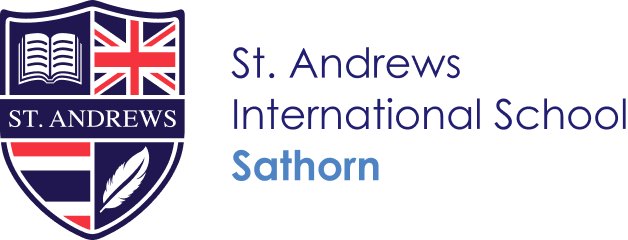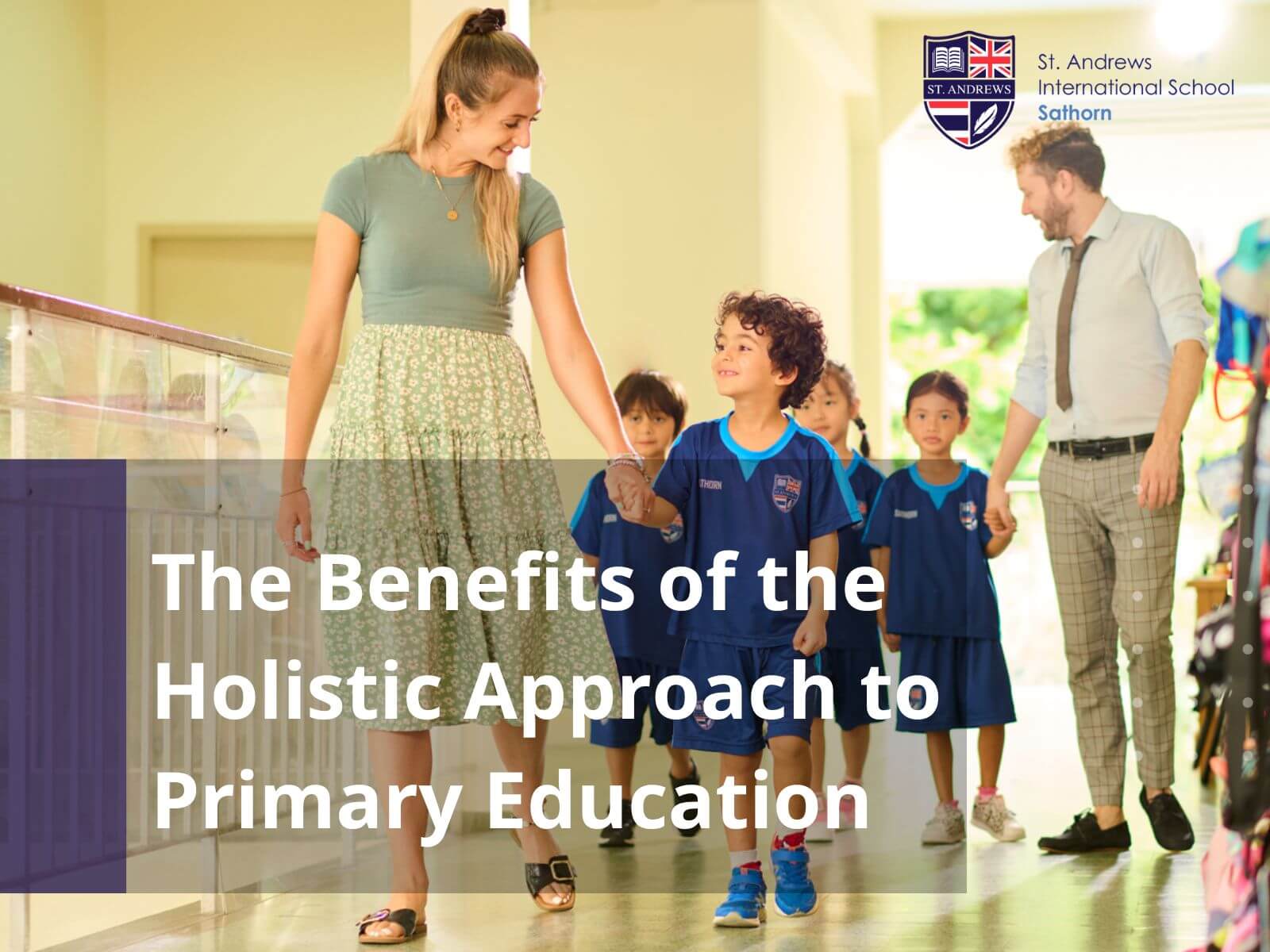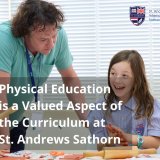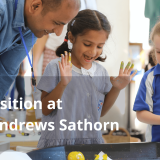Education is the cornerstone to future success and an essential factor in achieving equality, social cohesion, and economic development. It promotes individual freedom and empowerment. It also yields significant development benefits for the individual and the community.
Primary education is the first stage of formal education; hence it is crucial to ensure that all children have access to quality primary education. This can help them develop into successful learners in the future.
Early Years and Primary stages of education lay the foundation for children’s lifelong learning. It provides children with a well-rounded educational base upon which they can continue to build as they grow older.
At St. Andrews Sathorn, we believe in the holistic approach to primary education. It is the key to unlocking the potential of every child. Our focus is on the whole child – their physical, emotional, social, and cognitive needs.
We wish to provide them support in every aspect of themselves by going beyond core academics. Before exploring the benefits of holistic approach to education, it is important to understand the term, ‘holistic’.
What is the holistic approach to education?
Holistic means taking into account the whole person. When applied to education, it refers to taking into consideration the physical, emotional, social, and intellectual needs of each child. This approach is based on the belief that all of these areas impact each other.
No individual is an island, and we are all interconnected. A holistic approach to primary education understands and embraces this interconnectedness. With this specific approach, the focus is not only on the individual child, but on the child within the context of family, community, and environment.
Holistic education prioritises helping children develop into caring, joyful, and content individuals. Therefore, teachers applying this approach have to take into account the child’s social, emotional, and physical development when planning their lessons and activities.
Holistic primary education aims to provide a well-rounded learning experience for young children. It targets better academic outcomes, improved social and emotional development, and increased resilience against problems. Below are several more benefits of the approach in action.

Creates a positive learning environment
One of the most important advantages of the holistic approach is that it can assist in the creation of a more positive learning environment. When primary school children feel safe, valued, and supported, they are more likely to get engaged in learning and make significant progress in their academics.
In a supportive holistic environment with an emphasis on emotional and social learning alongside academic excellence, children are expected to emerge with a sense of social responsibility, confidence, and self-awareness. Their totality is being developed here.
Improves academic achievement
Naturally, holistic education can impact children’s academic achievements by also catering to personalised learning styles and providing them with a supportive learning environment that’s tailored to their personalities as individuals.
According to the Learning Policy Institute, children respond positively to lessons when they feel emotionally and physically safe as well as socially connected to others. No aspect of their being should be neglected to ensure the best possible outcomes on all fronts.
“At St. Andrews Sathorn we firmly believe that when children are socially and emotionally nurtured in a safe and caring environment, they develop the self-efficacy and self-belief that they ‘can do it’; allowing them to make strong well-rounded progress and achieve the highest academic standards that they can” Miss Helen Coleman, Deputy Head of School.
They can even be taught to learn by experience or by self-guided learning, which enables them to learn at their own pace rather than struggle to keep up at a pace set by the whole class.

Strengthens bond between young learners and teacher
Holistic learning can positively impact children by enabling them to form stronger bonds with their teachers. This specifically improves their engagement and performance in class. They have a higher chance of academic success in a nurturing and safe environment that focuses on holistic development.
Teachers can foster closer relationships with children by using the holistic approach to respond to their individual needs and strengths while acting in a culturally sensitive manner at the same time.
Teachers encourage the children to take on leadership roles or develop classroom rules to foster communication, cooperation, and trust among themselves. Increasing their motivation to succeed at an early age.
Celebrates every child’s uniqueness, strengths, and interests
A holistic approach to primary education means that every child’s uniqueness, strengths, and interests are celebrated or encouraged. This approach is based on the belief that each child is a unique individual with his or her own learning style.
Holistic education also features inherent flexibility, allowing teachers to personalise their curriculum to meet the personal needs of each child. The holistic approach allows each child to develop to their fullest potential in a safe and nurturing yet nonetheless challenging environment.
The teachers also work together as a team to differentiate instruction and meet the distinctive needs of every child involved. They can also collaborate with families to support each child’s social, emotional, and academic success.

Encourages creativity and problem-solving
The holistic approach encourages creativity, stimulates one’s problem-solving skills, and promotes a love for learning, developing skills to approach learning by unconventional or out-of-the-box thinking.
Creativity, communication, critical thinking, and collaboration are all important skills that they can nurture to become successful individuals in the future. Children undergoing holistic education can emerge with stronger critical-thinking skills, particularly when they are tasked to solve practical issues even at a young age.

Prepares children for the real world
A holistic approach to education prepares children for the future by encouraging them to both think independently and work collaboratively, whether it’s their future in middle school, high school, and beyond.
Outside of school, primary school children will sometimes have to do things by themselves and get used to being independent. They will need the knowledge and skills to be able to solve a problem or challenge and discover the answers to their own questions.
This approach to education helps children develop foundational, life-long crucial skills as they cross the threshold of child to teenager then to adult, creating adaptable and resourceful learners who are better equipped to face middle school and high school with solid basics.
In Conclusion
The benefits of the holistic approach to education are indeed many and varied, but some other important points include how it fosters a love of learning, instils confidence and self-esteem, and helps children to become independent, creative thinkers.
A holistic approach to education is beneficial not only for children but also for their families and the wider community. It helps create a sense of belonging and connectedness in the child while building strong relationships at home and school.
At St. Andrews Sathorn, we believe that the holistic approach is the best way to provide our children with a well-rounded education. We consider all aspects of each child’s development to help them reach their full potential.
Parent Testimonial:
“From the first moment the four of us went in through the school gates, we knew we had found somewhere special. Both our kids started at two years old in nursery and made their way through to Year 6. It has shaped our children’s lives and has prepared them for their next big step. We moved back to Germany for a year, but it was such a good feeling when we returned to meet old friends and teachers again.
St. Andrews always felt like family. It is a small school and teachers are caring and encouraging. Our children loved coming here and the school has played a major part in them growing in generous and kind-hearted people, appreciating other cultures and traditions. We love how children, teachers and supportive staff communicate across age groups. Everyone knows everyone.
St. Andrews will always carry a special place in our hearts.”
St. Andrews Sathorn, Burton Family.
St. Andrews Sathorn belongs under the umbrella of Cognita, a global private school group that owns and operates schools in Asia, Europe, Latin America, Middle East, India and North America. Cognita has more than 100 schools in 16 countries with 85000 students of 95 different nationalities.
Book a personalised school tour to further investigate if the holistic approach to education is best suited for your child’s education. During the tour, you will have the opportunity to meet the teachers and staff, see the classrooms and facilities, and ask any questions you may have.






